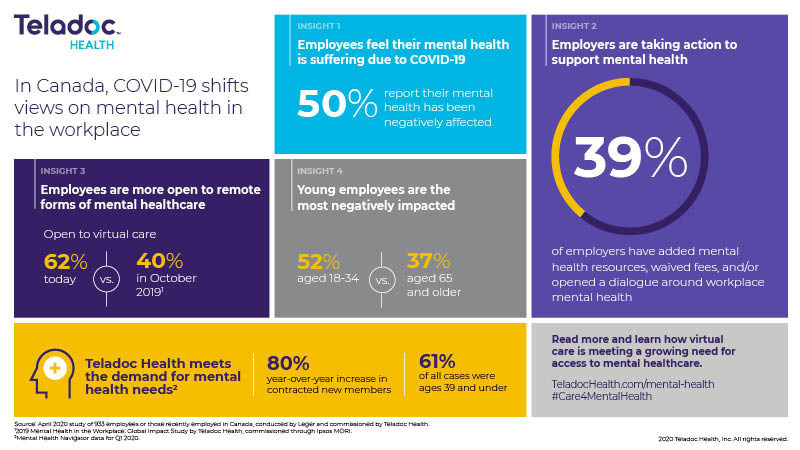

News
Mental Health
News
PSWA
Pandemic wreaks havoc on mental health, but employers stepping up: Survey
By Talent Canada Staff
 In Canada, COVID-19 shifts views on mental health in the workplace (CNW Group/Teladoc Health)
In Canada, COVID-19 shifts views on mental health in the workplace (CNW Group/Teladoc Health) More than one-half of Canadians say their mental health has been negatively impacted by the COVID-19 pandemic, but a growing number of employers are stepping up to provide assistance to their workforce, according to new research.
The study of 1,558 employees or those recently employed in Canada and the U.S. was conducted by Leger and commissioned by Teladoc Health.
Women, young Canadians hit harder
As a result of COVID-19, one in two respondents indicate their mental health has been negatively affected by the COVID-19 pandemic. The breakdown of this data shows:
- The negative impact on female respondents (57 per cent) is far greater than male respondents (43 per cent).
- 52 per cent of respondents between the ages of 18-34 were negatively impacted (This trend is similar to the U.S. where 49 per cent of the same age group reported being negatively impacted. It is also consistent with findings from the fall study that revealed a greater need of support for this demographic.)
- Respondents over the age of 65, an age group that has been deemed most at risk for the virus, experienced the lowest reported negative impact in both Canada (37 per cent) and the United States (38 per cent).
More employers providing mental health support
To support the growing impact on employees’ well-being, there is progress in opening the dialogue and closing the gap for mental health support in the workplace. Nearly 40 per cent of respondents in Canada, far more than the 27 per cent reported in the U.S., indicated that their employers have responded to the pandemic with some or all of the following initiatives:
- Offering additional mental health support
- Raising the discussion of employee mental health needs
- Waiving fees for mental health support
For example, Teladoc Health has expanded its benefits offering, assuring that all of the company’s 2,400 employees around the globe have access to and are aware of their free mental health benefits.
“The COVID-19 pandemic has given the mental health dialogue even greater importance and further advanced awareness and support for mental health among employers who are making it a priority,” said David Sides, chief operating officer, Teladoc Health.
“Our research from 2019 to today shows that we’re closing the gap in employer support for mental health, as well as employees growing comfort in the use of virtual care.”
Virtual care
With an increase in mental health education, awareness and support, comes increased comfort in seeking care and exploring remote care options. The study found that Canadian respondents with an employee benefits plan (66 per cent) are more aware of the mental health resources available to them than American respondents (55 per cent).
Furthermore, six in ten (62 per cent) Canadian respondents said they would be comfortable using virtual care for mental health support. A strong majority (85 per cent) of Canadians who have access to employee benefits said benefit plans should offer virtual care benefits as an option to support mental health concerns as they do with physical health needs. This new data represents a significant increase in support for virtual care over the past six months, according to Teladoc Health.
“This pandemic has further highlighted the access gaps and need for widespread mental health care. Our providers are hearing a louder voice for mental health support than ever before, particularly in young people,” said Dr. Gustavo Kinrys, medical director and vice president of Mental Health Services, Teladoc Health. “Seeking support to address mental health concerns is the new normal as more people choose not to bottle up their issues and keep them to themselves. The call for support is trending upward, as we play a critical role in working to help improve mental health education and awareness.”
About the study
Leger conducted the omnibus survey among 1,504 Canadians and 1,001 Americans between Friday, April 17 and Sunday, April 20, 2020, using Leger’s online panel. The margin of error for this study was +/-2.5% for Canada and +/-3.1% for the United States, 19 times out of 20. Questions were directed towards those who were employed or recently employed.
Print this page